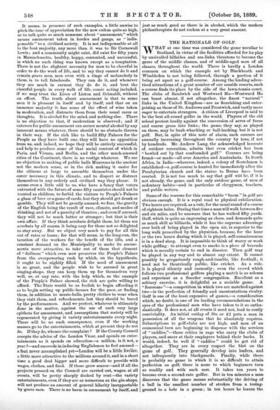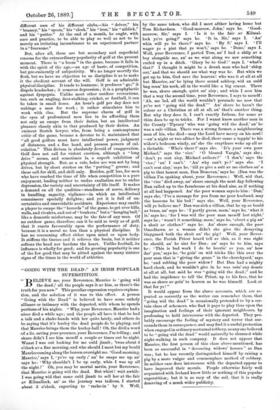THE RATIONALE OF GOLF.
-WHAT at one time was considered the game peculiar to Scotland, in virtue of the facilities afforded for its play by unrivalled hillsides and sea-links, threatens to become the game of the middle classes, and of middle-aged men of all classes, throughout the world. There is hardly a London common on which the example eet by Blackheath and Wimbledon is not being followed, through a portion of it being set apart as a golf-course. Among the leading adver- tised attractions of a great number of our seaside resorts, such a course finds its place by the side of the lawn-tennis court. The clubs of Sandwich and Westward Ho—Westward Ho can boast almost, if not altogether, the finest "natural" links in the United Kingdom—are as flourishing and enter- prising as those of St. Andrews and Prestwick, and vastly more eager to entertain strangers. A citizen of Liverpool is said to be the best all-round golfer in the world. Players of the old school protest loudly against the conversion of acres of furze and coarse grass into links ; the game, they say, as played on these, may be bush-whacking or ball-hacking, but it is not golf. But, in spite of this note of alarm, such courses are annually increasing throughout the country by tens, if not by hundreds. Mr. Andrew Lang, the acknowledged laureate of outdoor recreation, admits that even cricket has been " bowled out by that confounded golf." Courses are being found—or made—all over America and Australasia. In South Africa, in India—wherever, indeed, a colony of Scotchmen is established—a golf-course is hunted for immediately after the Presbyterian church and the statue to Burns have been erected. It is not too much to say that golf will be, if it is not already, the game, and the only outdoor game, of men of sedentary habits—and in particular of clergymen, teachers, and public writers.
Some of the reasons for this remarkable " boom " in golf are obvious enough. It is a royal road to physical exhilaration. Two hours are required, as a rule, for the usual round of a course of eighteen holes. During that time a man will walk between five and six miles, and be unaware that he has walked fifty yards. Golf, which is quite as engrossing as chess, and demands quite as much skill as billiards, while it has the supreme advantage over both of being played in the open air, is superior to the long walk prescribed by the physician, because, for the hour or the two hours daring which it is played, self-consciousness is in a dead sleep. It is impossible to think of worry or work while golfing : to attempt even to smoke is a piece of bravado which is morally certain to end in disaster. Then golf may be played in any way and to almost any extent. It cannot possibly be gregariously rough-and-tumble, like football; it need not be theatrically public, like cricket. As a rule, it is played silently and earnestly ; even the crowd -which follows two professional golfers playing a match is as solemn and expectant as a Seceder congregation. Excellent as a solitary exercise, it is delightful as a sociable game. A " foursome "—a competition in which two are matched against two—is the perfection of friendly and unostentatious rivalry. Golf is one of the least expensive of games,—a consideration which, no doubt, is one of its leading recommendations in the eyes of the professional men who have taken to it so enthu- siastically. It does not, at all events it need not, lead to costly
conviviality. An initial outlay of 30s. or puts a man in possession of all the weapons that he absolutely requires. Subscriptions to golf-clubs are not high, and men of an economical turn are beginning to dispense with the services of " caddies,"—those critics in rags who carry the clubs of players, and sneer at their employers behind their backs. It would, indeed, be well if " caddies " could be got rid of altogether. They are in every respect the blot on the game of golf. They generally develop into loafers, and not infrequently into blackguards. Finally, while there is probably no game in which it is so difficult to attain perfection as golf, there is none to which beginners turn so readily and with such zest. It takes ten years to become even a second-rate golfer. But in ten minutes a man discovers that the game means substantially the driving of a ball in the smallest number of strokes from a teeing- ground to a hole in a green ; in ten hours he learns the
different uses of his different clubs,—his " driver," his " bra.ssey," his " spoon," his "deck," his " iron," his " niblick," and his " putter." At the end of a month, he ought, with care and practice, to be able to play so well as not to be merely an irritating incumbrance to an experienced partner in a;" foursome."
But, after all, these are but secondary and superficial reasons for the extraordinary popularity of golf at the present moment. There is "a boom" in the game, because it falls in with the spirit of the age,—an age of haste, of competition, but pre-eminently of subjectivity. We no longer mortify the flesh, but we have no objection to so discipline it as to make it the obedient servant of the will. Golf is an admirable physical discipline. It tends to leanness; it produces " go ;" it dispels headaches ; it removes depression ; it is a prophylactic against dyspepsia. Unlike most other outdoor recreations, too, such as angling, deer-stalking, cricket, or football, it can be taken in small doses. An hour's golf per day does not unhinge a man for work ; it rather stimulates him to work with élan. But the supreme charm of golf in the eyes of professional men lies in its affording them not only an escape from their duties, but an intellectual pleasure closely akin to that produced by their duties. An eminent Scotch lawyer, who, from being a contemptuous critic of the game, became a devotee to it, maintained that "all good golfers must have intellectual power, judgment of distances, and a fine hand, and possess powers of cal- culation." This dictum is absolutely devoid of exaggeration. Golf does not call for violent exertion, although a " long drive " seems, and sometimes is, a superb exhibition of physical strength. But, as a rule, holes are won not by long drives, but by short strokes on the "putting " greens ; and these call for skill, and skill only. Besides, golf has, for men who have reached the time of life when competition is a pure enjoyment, leading neither to undue exaltation nor to undue depression, the variety and uncertainty of life itself. It makes a demand on all the qualities—steadiness of nerve, delicacy in handling, sagacity, vigilance—in which an intellectual connoisseur specially delights ; and yet it is full of un- certainties and unavoidable accidents. Experience may enable a player to escape the " hazards " of the game, to get over hills, walls, and rivulets, and out of " bunkers;" but a "hanging ball," like a domestic misfortune, may be the fate of any man. Of no outdoor game, therefore, can it be said so truly as of golf, that it reacts favourably upon the performance of duty, because it is a moral no leas than a physical discipline. It has no coarsening effect either upon mind or upon body. It stiffens the tissues and it relieves the brain, but it neither softens the head nor hardens the heart. Unlike football, its influence is wholly for good ; and its growing popularity is one of the few good that may be pitted against the many sinister signs of the times in the world of athletics.







































 Previous page
Previous page